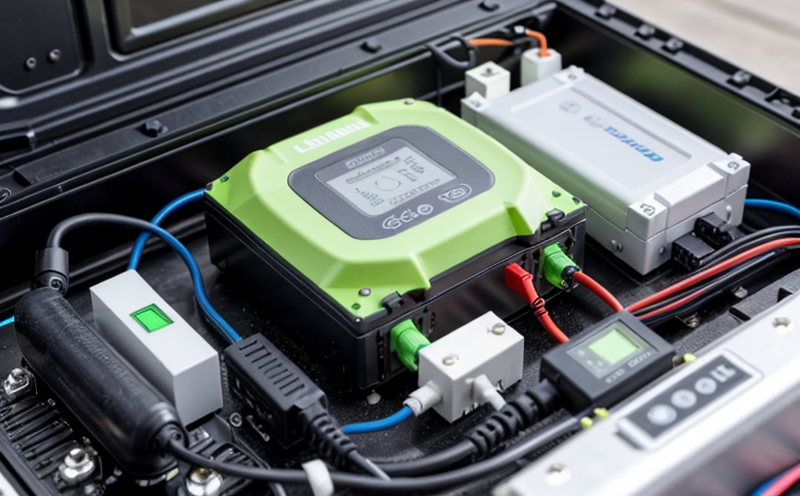IEC 62133-2 Safety and Performance Testing of Portable Lithium-Ion Batteries
The IEC 62133 series standards are pivotal in ensuring the safety, performance, and reliability of portable lithium-ion batteries. Specifically, IEC 62133-2 focuses on safety requirements for portable sealed rechargeable cells and batteries. This standard is crucial for manufacturers, quality managers, compliance officers, R&D engineers, and procurement teams involved in the development, testing, and certification of portable lithium-ion batteries.
Lithium-ion batteries are widely used across various sectors such as consumer electronics, automotive, medical devices, and more. Their high energy density makes them indispensable for these applications. However, their inherent nature also poses risks if not properly managed. IEC 62133-2 provides a comprehensive framework to mitigate these risks by specifying essential tests that ensure the battery's safety and performance.
The standard covers various aspects including mechanical integrity testing, electrical insulation, thermal stability, and more. It is designed to prevent failures such as short circuits, overheating, and explosion that could result in personal injury or property damage. By adhering to IEC 62133-2, manufacturers can demonstrate compliance with international safety regulations, thereby enhancing brand reputation and market access.
The testing process outlined in this standard is rigorous yet precise. It involves multiple stages where the battery undergoes electrical stress tests, overcharging tests, short circuit tests, temperature cycling tests, and more. Each test is designed to simulate real-world conditions that the battery might encounter during its lifecycle. This ensures that any potential issues are identified early on, preventing them from causing significant problems later.
The significance of this standard cannot be overstated. In today's interconnected world, where technology plays a central role in our daily lives, the safety and reliability of lithium-ion batteries are paramount. Non-compliance can lead to severe consequences, including recalls, legal actions, and reputational damage. By adopting IEC 62133-2, manufacturers ensure that their products meet the highest safety standards, thereby protecting both users and the environment.
Compliance with this standard also facilitates smoother market access by fulfilling regulatory requirements in different countries. As international trade expands, adhering to global standards becomes increasingly important for businesses aiming to export their products successfully. Understanding and meeting these requirements early in the development process can save time and resources later on.
Applied Standards
| Standard Number | Description | Scope |
|---|---|---|
| IEC 62133-2:2015 | Safety requirements for portable sealed rechargeable cells and batteries | Portable sealed rechargeable cells and batteries used in various applications such as consumer electronics, medical devices, and automotive components. |
| IEC 62133-3:2015 | Performance requirements for portable sealed rechargeable cells and batteries | The same as above, focusing on performance aspects rather than safety. |
IEC 62133-2 is part of a broader series that includes both safety (Part 2) and performance (Part 3) requirements. Together, these standards provide a comprehensive framework for ensuring the reliability and safety of portable lithium-ion batteries.
The application of IEC 62133-2 extends beyond just compliance; it also serves as a benchmark for quality assurance. By following this standard, manufacturers can ensure that their products meet not only regulatory requirements but also exceed them in terms of safety and performance. This is especially important given the rapid advancements in technology and increasing public awareness about product safety.
Eurolab Advantages
EuroLab offers unparalleled expertise in IEC 62133-2 testing, leveraging state-of-the-art facilities and experienced professionals. Our team is dedicated to providing accurate, reliable, and timely results that meet the highest international standards.
- Comprehensive testing services for all aspects of portable lithium-ion batteries
- Access to cutting-edge equipment and instrumentation
- Expertise in interpreting test data and providing actionable insights
- Support throughout the entire testing process, from initial consultation to final report delivery
We understand that compliance with global standards is critical for businesses operating internationally. EuroLab ensures that our clients not only meet but exceed these requirements, giving them a competitive edge in the market.
In addition to our technical capabilities, we also offer personalized service tailored to each client's unique needs. Whether you're looking for detailed test reports or just need advice on how best to comply with IEC 62133-2, EuroLab is here to assist you every step of the way.
Use Cases and Application Examples
- Consumer electronics manufacturers ensuring their products meet stringent safety standards before launch
- Automotive companies testing battery packs used in electric vehicles for durability and reliability
- Medical device firms verifying the safety of batteries powering life-saving devices
- Recreational equipment producers confirming that power sources are safe during rigorous outdoor activities
| Test Type | Description | Expected Outcome |
|---|---|---|
| Overcharging Test | The battery is subjected to an overcharge condition to simulate accidental overcharging scenarios. | If the battery does not short circuit or explode, it passes this test. |
| Short Circuit Test | A controlled short circuit is applied to check how well the internal protection mechanisms function. | The battery should safely disconnect itself without causing a fire or explosion. |
In each of these use cases, compliance with IEC 62133-2 ensures that portable lithium-ion batteries perform reliably under various conditions. This is particularly important for industries where the failure of a battery could have serious consequences. By adhering to this standard, manufacturers can build trust with their customers and ensure long-term success.





